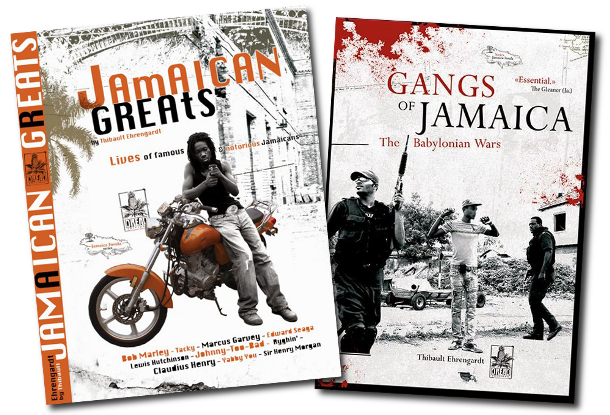Articles about reggae music, reviews, interviews, reports and more...
Interview: Thibault Ehrengardt about Jamaican Greats
- Home
- Articles
- Interviews
- Interview: Thibault Ehrengardt about Jamaican Greats

Interview: Thibault Ehrengardt about Jamaican Greats
Thibault Ehrengardt portraits a boiling island.
Jamaica is a country probably best known for reggae and its beautiful landscape and beaches. But also for its political and gang related violence. The latter has been subject to several books, for example Laurie Gunst’s Born Fi’ Dead from 1995 and Thibault Ehrengardt’s Gangs of Jamaica from 2011. Both target Jamaican crime and politics, and these issues are the theme in Thibault Ehrengardt’s new book Jamaican Greats – Lives of famous and notorious Jamaicans.

Thibault Ehrengardt has been involved in the reggae industry for more than 14 years. He was editor of French reggae magazine Natty Dread between 2000 and 2010, when the magazine ceased its publication. He shifted to publishing books via Dread Editions and his Jamaica Insula series includes a French translation of the above-mentioned Born Fi’ Dead.
His new book takes a deep look at the lives of ten famous and notorious Jamaicans – Bob Marley, Tacky, Marcus Garvey, Edward Seaga, Lewis Hutchinson, Trevor Wilson akaJohnny Too Bad, Ryghin, Claudius Henry, Yabby You and Sir Henry Morgan. The book paints a naked picture of these ten characters and shows that living in Jamaica is no fairy tale.
“Jamaican Greats was a farewell to Jamaica at a time when I had decided to put an end to Natty Dread Magazine,” says Thibault Ehrengardt.
He used to visit Jamaica about twice a year and knew his relationship with the island would be less intense when Natty Dread ceased, and he wanted to pay tribute to an island that had taken so much room in his life.
“It is sort of a testimony, or a letter sent to a younger me – ‘so, you wanted to see Jamaica so bad, now that you’ve seen it, what do you say?’,” explains Thibault Ehrengardt, and continues:
“And that’s what surprises me the most – now that I have been beyond most of my own personal clichés about Jamaica, about Rasta and about ‘badness’, I find these ‘naked stories’ even more fascinating. The incredible tale of Yabby You does not surprise me anymore, but his determination to live by it fascinates me more than ever.”
During the process of writing the book Thibault Ehrengardt found new perspectives on Jamaica, reggae and some of the main characters.
“Bob Marley might not have been the international freedom fighter I idealized as a teenager, but his position in the Jamaican struggle is now even more extraordinary to me – and his music sounds better when I listen to it in that context,” says Thibault Ehrengardt.
One of the stories that fascinated him the most was the one of former Prime Minister Edward Seaga (JLP), who played a central part in shaping and developing the Jamaican music industry. According to Thibault Ehrengardt he had to stop writing that particular part before it became a book of its own.
“I tried to analyse the facts and corner his unusual personality and unveil the repercussions he had on his own country. I never really knew reggae before I knew all that,” explains Thibault Ehrengardt, and concludes:
“Reggae is an islanders’ music, an epic music, fed on its own mythology. It took me 15 years or so, but I think I’ve come to find out what I was looking for the first time I set foot on this island. And that’s what Jamaican Greats is all about.”
Jamaican Greats is now available as hard copy and e-book.
Read more about this topic
Comments actually desactivated due to too much spams
Browse by categories
Recommended Articles
Latest articles
Recently addedView all
© 2007-2026 United Reggae. All Rights Reserved. Reproduction in whole or in part is prohibited. Read about copyright
Terms of use | About us | Contact us | Authors | Newsletter | A-Z














